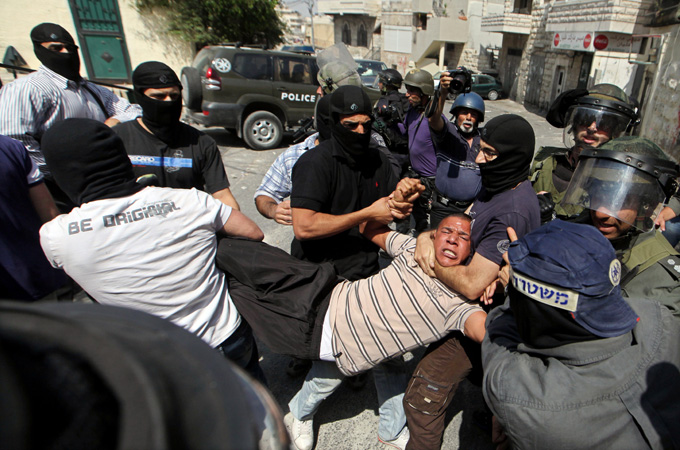"Conquerors, my son, consider as true history only what they have themselves fabricated."
 |
| A Palestinian nakba protestor is detained by the IDF |
Today
commemorates an important and tragic date on the Palestinian calendar: the
anniversary of the ‘nakba’ (Arabic
for “catastrophe” or “disaster") of 1948, when hundreds of thousands of
Palestinians were forced from their homes or fled for fear of violence at the
hands of the Israeli army. The 5.3 million Palestinian refugees worldwide are
the modern-day descendants of the victims of the nakba. Like so many sad chapters in the histories of powerful
countries, outside of Arab communities the nakba
is not widely recognized or reported upon. Over 700,000 Palestinians fled in
the nakba of 1948, the forebears of
the huge community of Palestinian refugees scattered throughout the world
today. While in the initial decades after the events of 1948, only a small
number of internally displaced Arab Israelis commemorated the nakba, now it has
become a political symbol of the destruction of the Palestinian community and
is observed throughout the occupied territories, the West Bank and the Gaza
Strip.
Protests
against the Israeli government, military, and occupation are the main form of commemoration
on the nakba. Protestors often carry metal keys with them, symbolizing the
homes that they were forced to give up in 1948. They also target checkpoints,
military installations, and government buildings, and many make a pilgrimage to
Palestinian leader Yassir Arafat’s mausoleum. Flags are often burned, both Israeli and American, as well as effigies of Israel's leaders and a US President here and there for good measure. Actors also reenact scenes from
the nakba for onlookers, often graphically. One of the central demands of Palestinian activists is
a right to return for all displaced in the nakba and subsequent wars with Arab
countries; the nakba commemorations give voice to this demand while creating a
security thorn in the Israeli government’s side.
Because
of the growth of the protests and the form they take (many protestors approach
Israeli checkpoints, both in occupied territories and on the Israeli borders),
violence has broken out resulting in dozens of deaths and hundreds of injuries.
When, in 2011, protestors from Syria tried to force their way into the
Israeli-occupied Golan Heights, twelve people were killed and hundreds
injured as the Israeli Army opened fire on thousands of protestors. As a response to the violence, the Knesset
passed a law
that cuts of government funding to groups who organize events to commemorate
the nakba, claiming that such events deny the existence/creation of the state
of Israel. Lawmakers also claimed the law aims to reduce violence that often
accompanies protests. Yet the violence has resurged this year, with two
protestors killed today by Israeli soldiers outside a military base in Ramallah.
 |
| Children in Nablus carry commemorative flames |
For
its part, the Israeli government is, to put it mildly, uncomfortable with
commemorations of the nakba. Not only
do protests create a security problem on and within Israel’s borders, but the
event itself does not cast the Israeli government and military in the
kindest of lights. Much like the US following the expulsions of Native
Americans, the government has waged an active campaign to keep the nakba out of Israeli history and Israel
itself. It has come under fire repeatedly as several (Israeli-authored)
studies have shown that the depiction of the nakba in Israeli textbooks, when it is acknowledged at all, is
actually portrayed as a positive event that was crucial for creating the state
of Israel as it is today. While the latter statement may be true, and no Israel
would have been possible without the eviction of the Arab population, the
former is certainly more controversial. Hundreds of thousands of people were
forced to give up their homes and become refugees, many died in the process,
and one of the most intractable political situations in the world was born of
the nakba. That hardly qualifies it
to be treated as a positive event.
Of
course, recognizing the nakba as a tragedy or accepting culpability would put
the Israeli government in a precarious position: in a Jewish nation that is
already 25%
non-Jewish, with non-Jewish populations that have a higher fertility rate than
their Jewish counterparts, suggesting that there might be a right of return for
Palestinian refugees by acknowledging the nakba could spell demographic
disaster. Since Israel is already coping with sizable socioeconomic
divisions and the fear of losing its Jewish identity, a change in the nakba
policies will not soon be forthcoming.
Yet
the Israeli government seems to be making a
rather ironic error in its calculations. By forcibly and violently dispersing
protests and instituting policies denying the occurrence or tragedy of the nakba,
they give their detractors more ammunition to call Israel an “apartheid state”
and portray the government as non-democratic oppressors. If the government were
able to show humanity and empathy by at least acknowledging the events of the
nakba, without guaranteeing any rights of return, some of the wind might very
well be taken out of its opponents’ sails. Like so many governments before it, Israel's administration seems determined to take the path of denial whatever the costs. Yet denying the events of the nakba will not force its victims and their descendants to forget, and the Israeli government may yet find that to deny history is to doom oneself to repeat it.
No comments:
Post a Comment